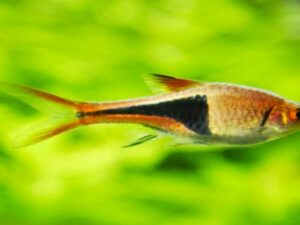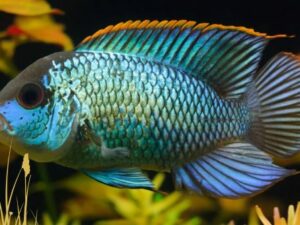Betta fish is a type of Siamese fighting fish that can be found in Asia. It comes from warm and tropical areas and originally inhabits rice paddies and other vegetation-filled waters.
They were bred for their aggressive tendencies, so they will fight with any other male Betta fishes you may have in the same tank.
However, if you plan on keeping and breeding female betta fish and male betta fish, they will most likely not fight. Betta's can be found in a spectrum of colors, but the blue and purple varieties are most common.
Facts And Characteristics Of Betta Fish
Given below are some of the facts and characteristics of betta fish.
Appearance Of Betta Fish
Bettas are generally a bright color but a duller shade in the wild. The most common betta fish is red or dark orange with long fins with lighter shades and spots on the tail. Bettas also come in blue, green, black, white, yellow, and many other colors.
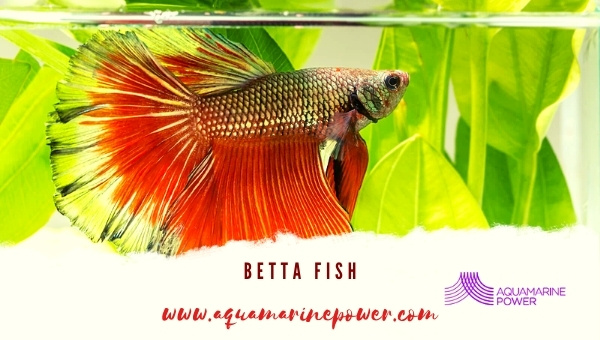
Their eyes are round with a dark dot in the middle. Betta's come in a variety of colors, but the blue and purple-colored betta is common. There are also bettas with red and green colorings. The body of the betta has two main parts: head and tail. Their tails can be long or short.
Long-tailed varieties include veil tails, crown tails, half-moon, delta tails, and super delta tails. They also have a central and dorsal fin. Females will generally not fight as much as male betta fish, but it is still possible that they might duke it out among each other if kept in the same acrylic fish tank.
Betta fish will generally grow to about three inches in length. Females are usually smaller than males, but it varies by species. They have a torpedo-shaped body that is compressed laterally with large, bright scales all over their bodies.
The male's fins are longer and more vivid than the females' fin, which is used for swimming instead. Males' fins are just used to looking pretty.
To impress females, the males tend to flare or puff up their gills and fins. Males will also usually build nests out of the plants in the tank and defend them from other males.
Average Lifespan And Size Of Betta Fish
The average betta fish can live about 2-3 years. Some will only live for a year, while others could live up to 5 or 6 years if they are well taken care of and in good health.

An adult betta fish will usually grow to be about 3 inches in length. Females are more slender than males, but it varies by species.
Also Read: Celestial Pearl Danio 101: Best Care Guide
Temperament Of Betta Fish
Betta fish are generally quite active. They swim at a steady pace, darting from side to side and back and forth when they want to move across the tank quickly.
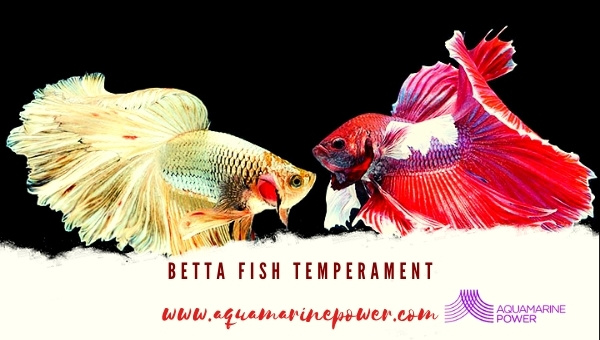
If you have multiple bettas in one tank, they usually won't fight unless there is no hiding place around them or if their tails get caught together. A betta with no tail is not dead yet. He or she can still recover even though they are now tailed bettas.
Betta fish generally cannot survive in temperatures lower than 70 degrees Fahrenheit, so it's important to keep them in an aquarium with a good heater. The betta will move around more quickly when you keep the tank at around 78 degrees.
Breeding
Betta fish are known for fighting but can be bred. Breeders have been developing different breeds of bettas to add to the ever-growing list of colors and tail types.
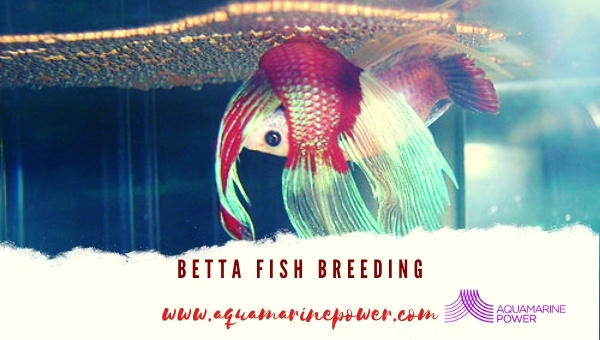
You probably won't want to breed them unless you plan on selling them or giving the baby betta fish away because keeping male and female betta fish together can be dangerous if you don't want them to breed all the time.
Breeding takes place when the male and female betta fish release their eggs and sperm into the water, where it then fertilizes the eggs. The next step is that they need to hatch into larvae and then grow into adult betta fish after about a month.
The breeding process takes about a month, but if one keeps the two bettas in the tank until the eggs hatch, you have to feed them for another month.
Read: Rummy Nose Tetra 101: All You Need To Know
Habitat Of Betta Fish
Betta fish typically live in puddles, rice paddies, and slow-moving streams in the wild. They live in shallow water, so it's best to keep their tank at a depth of about one foot.
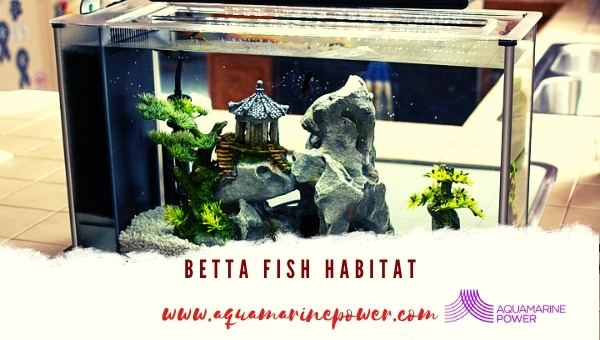
They come from Thailand and other areas in Southeast Asia and usually live among plants or near something that keeps them out of direct sunlight because they tend to become overheated. They are often found in the Sun, near plants, or something to keep them out of direct sunlight.
Are They Dangerous?
These fish might not be dangerous but rather sensitive because of poor water conditions and neglectful owners. Make sure to change the water frequently and keep the tank clean. They are not very difficult to care for once you know what kind of environment they require.
Betta Fish Care Guide
Below are a few things that you need to keep in mind to keep your betta fish healthy.
Tank Requirements
Betta fish need at least a gallon of water to change and move around. A 2.5-gallon tank is sufficient for one betta fish, although the more, the merrier!
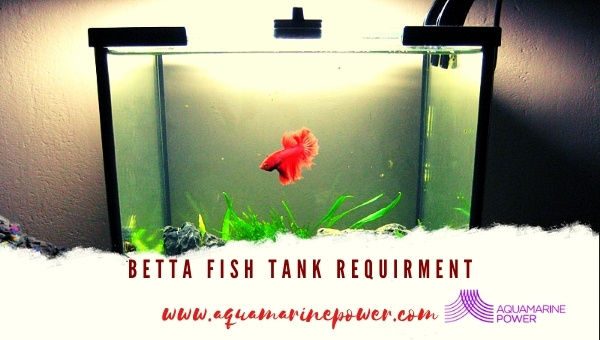
The tank should be decorated with either real or fake plants for hiding places. The bottom of the tank can contain gravel or marbles to create a natural look.
Although the betta fish is considered a tropical fish, it cannot survive in temperatures lower than 70 degrees Fahrenheit, so it's important to keep them in an aquarium with a good heater.
A betta's natural habitat is usually shallow, murky water in Thailand and other areas of Southeast Asia. It prefers to stay among plants or near something that keeps it out of direct sunlight because it tends to become overheated.
A lot of people choose to decorate their tank with silk or plastic plants, which the fish also enjoys. The bottom of the tank can contain gravel or marbles to create a natural look.
Also Read: SWORDTAIL FISH FULL CARE GUIDE: ALL YOU NEED TO KNOW
Water Condition and Lighting
The betta fish prefers room-temperature water with a neutral pH level so it can live comfortably. If you have difficulty achieving these conditions, it's recommended to buy a heater.
Room temperature and at least 1 gallon of water so they can move around. A pH of 7 is ideal for this species. A heater is recommended if you cannot get the water to the desired temperature.
To keep a betta fish healthy and happy, you need to regularly change the water. If there are plants in the aquarium, make sure they don't block the filter's output. A heater is also recommended if you live in an area with cool temperatures (below 70 degrees Fahrenheit).
The betta is very sensitive to pollutants and needs clean water. You need to change the water at least once a week, so you might want to get an aquarium vacuum to suck up loose debris. Use an aquarium glass cleaner to remove hard-to-reach deposits on the glass walls.
The betta fish prefers room-temperature water with a neutral pH level so it can live comfortably, and it is very sensitive to pollutants. You should change the water at least once a week and get an aquarium vacuum to suck up loose debris.
The lighting in your tank should be minimal since these fish are nocturnal. You can add some LED lights if you want, but avoid bright light and fluorescent lighting at all costs because it can damage the fish's eyesight and cause serious health problems.
Keep the lighting in your tank minimal, and avoid bright lights and fluorescent lighting at all costs.
Feeding
Betta fish primarily eat insects such as brine shrimp, bloodworms, and tubifex worms. You can feed the betta fish flakes, pellets, freeze-dried bloodworms, or freeze-dried brine shrimp.
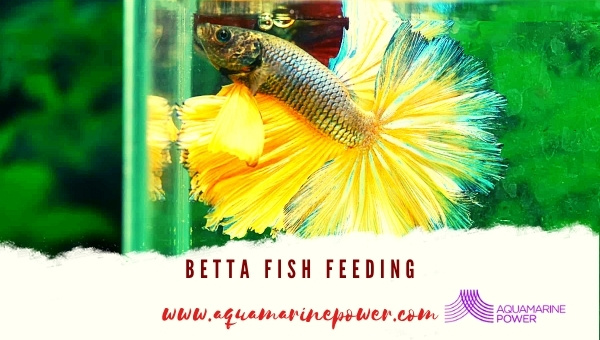
You can also feed them live foods. Squash is also a common food given to the betta fish because it usually does not have any nutritional value for the betta.
A betta fish diet typically consists of flake food, which you can buy from any pet store in captivity. They also eat live foods such as brine shrimp and bloodworms, but they have to be small enough for the betta to eat them whole.
Freeze-dried forms of these are available as well. You can feed your betta fish three times a day and take out any excess food after it has been eaten to keep the water clean.
Betta fish ate once or twice a day. You can feed them as much as they will consume in 2-3 minutes.
Tankmates Of Betta Fish
It's best to keep your betta fish in a 5-gallon tank separate from any other kind of fish because they can become aggressive towards other fish, so it's better to have other kinds of fish in a different tank.
If you separate them, you can have the following fish in your tank: guppies, mollies, mosquito fish, goldfish, and killifish.
Fishes that can live with betta fish are guppies and mollies. These fish don't nip at the fins of the beta, and they also like similar water conditions and temperatures. Some people have had success keeping bettas together with mollies, but they may still nip at the betta's fins.
Betta fish do not fare well in community tanks with other fish because they tend to be aggressive at feeding time. Other species of tropical fish may interact destructively with betta fish, so it's best to keep them in tanks by themselves.
Betta fish should not be kept with other species because they are aggressive at feeding time. They should be kept in tanks by themselves.
Aquaspacing
It's best to add some driftwood and real or fake plants for hiding places. If you want a more natural look, adding sand instead of gravel is recommended.
You should add some driftwood and real or fake plants for hiding places. Sand can create a more natural look instead of gravel.
Equipments Required
The betta fish prefers room-temperature water with a neutral pH level so it can live comfortably. If you have difficulty achieving these conditions, it's recommended to buy a heater.
You should change the water at least once a week and clean out your tank frequently. The lighting in your tank should be minimal since these fish are nocturnal.
Apart from the heater, these fish might also need equipment like tanks, ornaments like silk, low light plants, gravel, etc.
Common Possible Diseases And Their Cures
The common diseases they suffer from are:
- Sudden Hanging: The fish just suddenly hangs at the top.
- Dropsy: It is characterized by swollen belly and scales sticking out.
- Swim Bladder Disease: It makes them float up, but they can't swim down.
- Fur Coat: They look like their body is covered with fine white powder.
- Cotton Mouth: The fish just suddenly stops eating and looks like it has a cottonmouth.
- Fungal Infection: It is characterized by the appearance of white dots on their body.
- Fish Lice: They appear as black spots moving all over the body of the beta.
- Bacterial Infection: This infection makes the fins look shredded.
- New tank syndrome: It is the beta's response to the sudden change of environment.
- Velvet Disease: These are found as small dark brownish-red spots on the body of the fish.
In the case that your betta does get sick, you can usually use a broad-spectrum antibiotic like penicillin and do frequent water changes in addition to any other medication.
If you discover your betta is sick with fin rot, you should use a broad-spectrum antibiotic like penicillin and do frequent water changes in addition to any other medication. Other possible illnesses include Head and Lateral Line Disease, Constipation.
Betta fish can be easily kept if you follow these simple steps and maintain good water condition, good lighting condition, and house them in a 5-gallon tank or bigger tanks by themselves.
Betta fish tend to die due to poor water conditions and neglectful owners. Make sure to take care of their tanks and give them a healthy diet to make sure they live as long as possible. Take good care of your betta fish by keeping the tank clean and giving them a nutritious, balanced diet.
In the case that your betta does get sick, it's important to be able to provide medication for them. Some easy medications you can use are Fluke-Tabs and Jungle Fungus Eliminator.
Conclusion
Betta fish are very easy to care for, but they can be sensitive if certain conditions aren't met. They don't fare well in community tanks with other fish because of their aggression.
Before you get one, make sure that you are ready to take good care of it by keeping the tank clean and giving them a nutritious, balanced diet.


